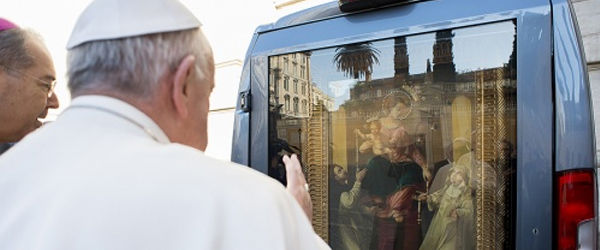At my house, whenever the air conditioning turns on, our lights go dim for a second or two. It makes me nervous. I wonder if one of these days the whole house is going to lose power. It’s as if there is only so much energy available, and the air conditioning takes the power source to its limits.In today’s Gospel reading, we see people who view Jesus as this kind of power source. A religious leader comes and begs Jesus to touch his sick daughter in order to heal her. A sick woman, an outcast, sneaks up to touch a fragment of Jesus’ clothing in order to be healed. The woman is healed, and Jesus makes it clear to her that it was not his garment that healed her: “Daughter, your faith has healed you.” Then Jesus goes to the home of the synagogue official where people fear the leader’s daughter has died. “The child is not dead, but asleep,” Jesus says. He goes on to heal the girl without touching her. “Little girl, I say to you, arise,” Jesus says. The girl “arose immediately and walked around.”What do these stories tell us about the power of God? A couple of things, I think. One is that God’s power, unlike PG&E, is not predictable. God is not a machine that we can force to work to our liking. We might be led to think that there is something automatic about God’s power, and that we can access it if we say the right prayers, attend the right ceremonies and perform the right deeds. Both people in today’s Gospel believe, or have faith in Jesus’ power to heal, but both thought that the power resided in Jesus’ physical body, and that healing would be automatic. Jesus showed them otherwise. We know from experience that God doesn’t always accommodate our preferred schedules. Another thing today’s Gospel tells us about God’s power is that it is impartial. Jesus heals the “nobody” in his midst before attending to the socially and religiously important person. God, of course, doesn’t view people or value people the way we do; nowhere is this more clear than in today’s reading. A woman who has been living at the fringes of society gets Jesus’ full attention. He even calls her “daughter,” embracing her as a child of God. We are called to do the same — to see the needs of the weakest and neediest members of our communities as just as important as our own needs. God’s power is unlimited. We don’t need to worry about using too much of it. We are invited to plug in as many times as we can. But it is not predictable and it is not partial. Faith means believing in a God who heals us — not because He has to, but because he wants to. Bill Peatman writes from Napa. He may be reached at [email protected].

